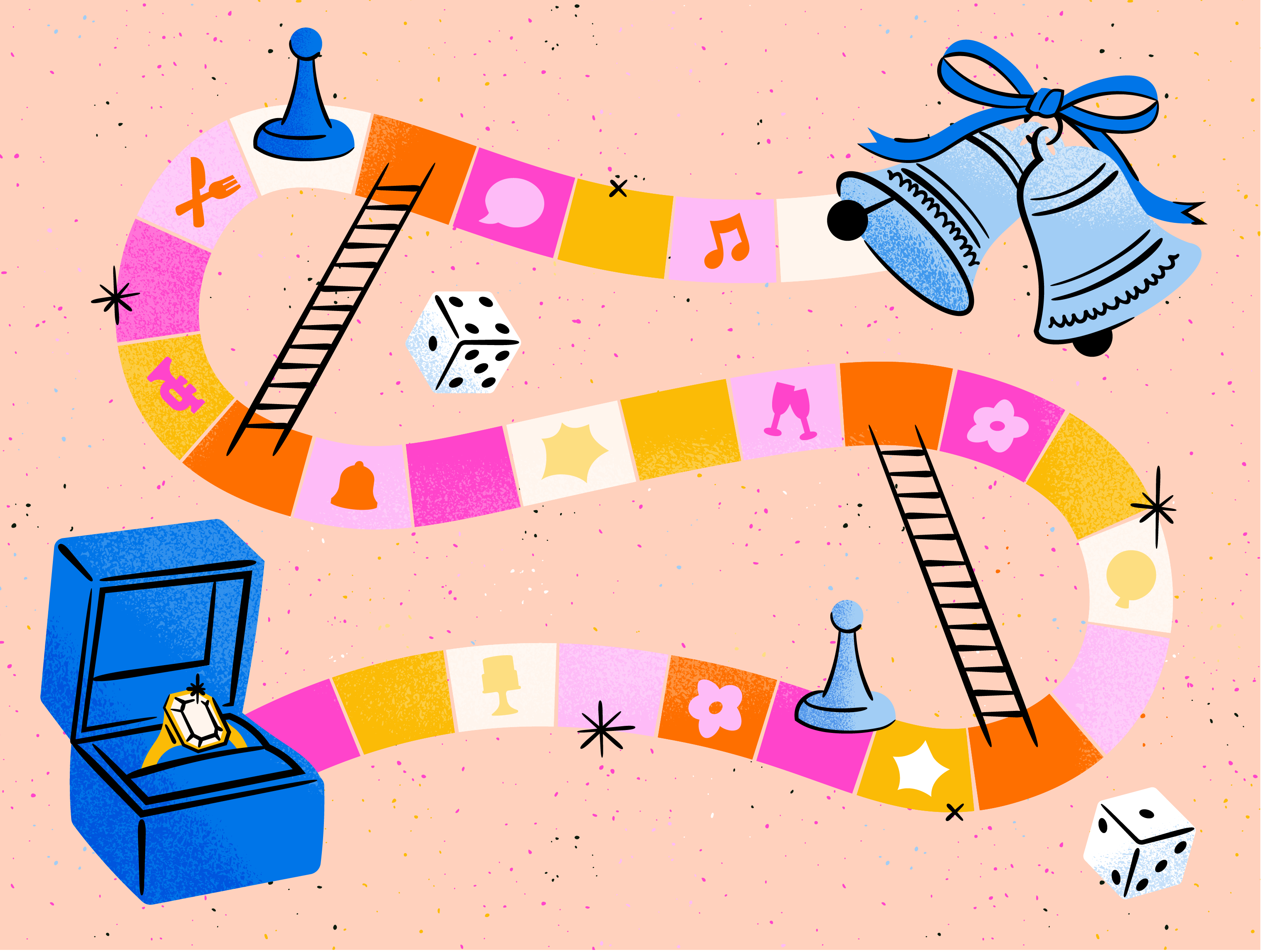How to Cope With Resentment While Waiting for a Proposal
Whether you've been dating for six months or six years, the pressure and resentment of waiting for a proposal can start to rear its head, especially when you're faced with self-imposed timelines, anxiety around starting your next chapter, or watching others around you getting engaged.
"Being patient when it comes to relationship goals is challenging. Feeling resentful is a sign that your patience has expired," says Dr. Michele Leno, PH.D., LP, Founder of DML Psychological Services, PLLC.
Maybe you spend late nights googling how long is too long to wait for a proposal or you find yourself dreading family get-togethers because you know the engagement questions will come up from well-meaning relatives. You don't want to spend your days resentful over waiting for your partner to pop the question, but learning the skills to cope isn't something that comes naturally. Here's what four experts share with their clients who find themselves counting down the days until there's a ring.
In this article:
- How Proposal Resentment Impacts Your Relationship
- How to Deal With Resentment Waiting For a Proposal
How Proposal Resentment Impacts Your Relationship
When you're deep in the feelings of wondering how long is too long for a proposal and fighting off resentment over the lack of proposal, it's difficult to see how it's impacting not only you, but your relationship.
But resentment is never a positive feeling within a relationship, and it's something that eats away at both parties, including the one who is resented. "Proposal resentment can affect how you feel about your partner. It can create a hostile environment for you both," says Leno.
Brittany Pinto, LMSW, Therapist at The Boutique Psychotherapy Center, explains that resentment comes from unmet expectations and emotional distress, and it contributes toward a lower level of relationship satisfaction. She explains, "Partners may find it challenging to fully enjoy their time together when they feel like they are on different pages, and underlying issues are causing feelings of negativity. Additionally, emotional tension can spill over into physical intimacy, affecting the sexual and romantic aspect of the relationship."
But Amy Morin, LCSW points out that this can be avoided in a healthy relationship by talking about expectations and timelines, even when you know the answers may cause consternation between you and your partner. "One partner may be waiting for a milestone, like paying off their student loan or becoming more settled in their job. The other partner might be basing the timeline on emotion. If they feel ready, they may not want to wait," says Morin.
A direct and calm conversation can avoid the resentment, letting you and your partner focus on your relationship now, not the next step.
How to Deal With Resentment Waiting For a Proposal
Ideally, you and your partner will find ways to work through this resentment and come out stronger on the other side. There is some work you can do together, while other inner work needs to be done on your own. Here's how the experts help their clients through periods of resentment over waiting for a proposal.
Embrace vulnerability and advocate for your own needs.
Jason Powell, LMFT, CST, Founder at Attached Therapy, explains, "One of the most important things that you can do to deal with the anxiety of waiting is to be an advocate for your own needs. If you are feeling a lack of connection, fearful of your partner's level of commitment, or are experiencing some relational sadness, name those things." He explains that these are human feelings and you can give your partner the opportunity to show up for you, even when the engagement is part of the anxiety.
"Practice sharing what it is like for you, as well as asking for what you need to be soothed and comforted," adds Powell.
Communicate WHY you want to get married.
Your partner's delay could be because marriage isn't a priority for them, and they don't understand why it is for you. Pinto says, "Reiterate to your partner the reason that it's important for you to get married. It's important for your partner to understand why this means so much to you. Focusing on the strengths and positive moments can help shift the overall tone of the relationship."
Focus on the present.
Leno explains, "There are positives to simply being together without worrying about what's next. Sometimes we spend so much time thinking about the future that we miss out on the present. Try to enjoy spending time together simply as a couple."
Ask yourself whether there's a clear timeline.
If you're spending time silently resenting your partner for not proposing, it's worth asking one simple question to decide whether you both are on the same page. "Did you discuss a clear timeline for engagement or marriage?," asks Leno. If you haven't discussed it, then they may not realize there's resentment at all. And if you have, then it's worth coming to a compromise on the date.
Think about how an engagement will change things.
It could be time to sit down and think about whether you're hoping for this because you want something else. "How will things change once you are engaged?," asks Leno. Are there things you hope will change for the better? Is it really an engagement you want? Or is it something else?
Talk to someone.
Your partner can't be the only recipient of your worries, and they're also not in a position to offer advice. Pinto says, "Talk to someone, that is not your partner. It's important that you have an outlet to talk about your worries and frustrations with someone other than your partner, whether that be a friend, family member or therapist. "
Maintain relationships outside of this relationship.
"Maintain relationships with friends. Spending excessive time with your partner may cause you to obsess over a proposal," says Leno. Try to focus on activities that aren't going to remind you of the waiting game—meaning going wedding dress shopping with a friend or attending a bridal shower shouldn't be your only other social activities.
Take a break.
If you can't separate the anxiety over waiting from the way you're interacting with your partner? "Taking a break can be more favorable than spending time with someone you resent," says Leno. You can mitigate damage by taking a deep breath and spending some time apart.
Don't let the resentment linger.
If it all works out? Focus on the positive. "Your happily ever after is possible. However, you must first let go of the past. Once you are engaged do not hassle your partner about the fact that they 'took too long' to propose," says Leno.
Know when to move on.
And sometimes, the best thing to do is accept that your resentment was valid, and this proposal isn't going to happen. Morin explains, "There are times when I've seen people decide to move on when a proposal didn't happen. Sometimes, it's healthy and freeing for individuals to move forward."
























